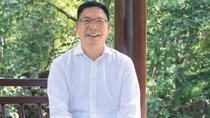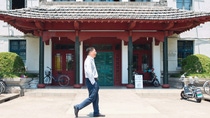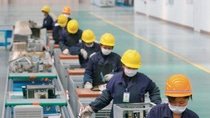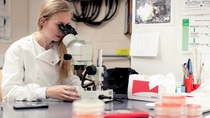Who we are
Circular vision in the East
As China’s economy grows, its approach to circular economy thinking matters to us all. Professor Du Huanzheng, his country’s foremost promoter of the idea, believes China has a few things to learn but also a lot to share about this new economic model.

Creating Chemistry: How do you define a circular economy?
Professor Du Huanzheng: In a linear economy you proceed from raw materials to products, then to waste. In a circular economy, there is a complete circle from raw materials to products and then back to renewable resources. Here in China, we go further and think about the circular economy as a new economic model that changes both our production methods and lifestyle. The tradition has been one of mass production, mass consumption and mass waste. What we need now is eco design at the beginning of production, environmentally friendly production, including recyclable and biodegradable products, responsible consumption and recycling, all with the ultimate goal of achieving sustainable development for human society.
“In China, we think about the circular economy as a new economic model that changes both our production methods and lifestyle.”

How did you personally first become interested in circular economy thinking?
In 1985, I took some students to a small city near Wenzhou, one of the biggest manufacturing bases for low-voltage electrical apparatus in China. They collected old transformers from all over China, repainted and sold the good ones. From the rest, they split out the silicon steel sheets and made them into new, smaller transformers. So in China in the 1980s, we wanted to avoid waste to address the problem of insufficient resources. Then at the beginning of 21st century, we started to think about resource recycling in terms of the impact on the environment. This is in contrast to Germany and Japan, which started from environmental concerns and are now also including resource issues.
From a Chinese perspective, which areas of circular economy thinking are most urgently needed?
To guide the transformation, leaders need to change their way of thinking. The central leadership has already done that. Now local government leaders need to follow. China has developed so fast in the past 30 years because county leaders were promoted to mayors and mayors to vice governors on the basis of gross domestic product (GDP). But this has led to a waste of resources. Construction is GDP, demolition too. We need to adopt “resource productivity,” which is GDP divided by consumption of main resources, as a new assessment method for leaders. In China, these are represented by the 13 most widely used, main raw materials, like coal, steel and copper.
“In the West, industrialization took almost 200 years. Here in China, we have had to compress this development into a much shorter period.“
China has announced ambitious plans to promote a circular economy and written them into its recent Five Year Plan. This is both admirable and surprising. Why is China, which is still catching up with western economies, already embracing these ideas?
In the West, industrialization took almost 200 years. Here in China, we have had to compress this development into a much shorter period of just three decades, solving not only the problems that developed countries encounter, but also those that developing countries face. As a responsible power, China should play a leading role in global sustainable development by being at the forefront of wind, solar and other clean energies. We want to find a way of making a great leap forward in development that can be an example for other developing nations.

While China is very good at planning and formulating goals, it often seems to have a harder time implementing them. In many cities there is not even basic garbage separation and recycling of consumer waste. What are you doing about this?
It is a big issue. We started a garbage separation pilot program in 2000 in eight cities including Beijing and Shanghai. Sixteen years later, it still hasn’t succeeded. There is always a call-to-action by the government, then a document issued, followed by media coverage and leaders showing up at the scene. But there is no long-term mechanism. We are now working on a system solution for urban waste in Guangzhou that includes initial garbage separation, collection and sorting, followed by classification and disposal by class. With the system in place, we will invite private sector enterprises to participate and make it sustainable.
In order for the circular economy to work well, partners along the value chain have to work closely together to create and implement solutions. How does China support such cooperation?
The circular economy solves both environmental and resource problems. Environmental problems are a public issue. The resource issue, however, is a market one. Resource recycling is only accomplished through cooperation between government and the market. If we want to recycle discarded milk cartons or glass waste, for example, the government can provide the missing part of the value chain by subsidizing low-added-value waste or by Extended Producer Responsibility solutions.
Undeniably, China’s environmental efforts do not only concern China alone, but have implications for the whole world. Is there enough international cooperation?
We strongly feel that we need international cooperation to promote a circular economy. We need to learn from other countries, but also need to show the world our good case studies. That is why we have set up various international cooperation platforms with major developed countries such as the United States, Japan, and Europe. The U.S.-China EcoPartnerships Program, under the U.S.-China Strategic and Economic Dialogue, is one of these platforms, and has launched 42 EcoPartnerships so far. The Yangtze River Delta Research Academy of Circular Economy, of which I am the director, has partnered with the Coca-Cola Company to promote manufacturing eco-friendly bottles with local agricultural waste rather than petroleum-based ingredients. We have worked with Japan on recycling urban waste, and launched a project with Germany on recycling batteries. We also organize annual training courses on circular economy in developing countries so as to share successful case studies.
Looking to the future, are you optimistic about achieving a circular economy?
I think it is something we absolutely have to develop if mankind wants to exist and develop sustainably. With leadership from governments, the participation of the public, and implementation through private enterprises, I firmly believe that the circular economy can be achieved in China and globally.

“With leadership from governments, the participation of the public, and implementation through private enterprise, I firmly believe that the circular economy can be achieved in China and globally.”


